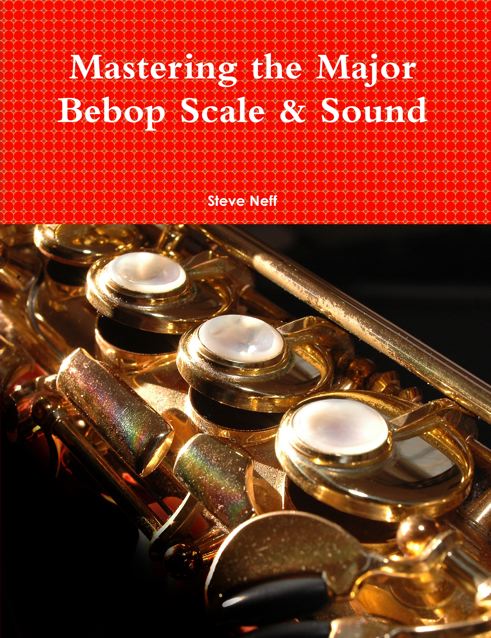Back when I was in junior high school I was introduced to the playing of Charlie Parker. It was 9th grade and up to that point all I had listened to was Spyro Gyra, Chuck Mangione, Dave Sanborn and the Yellowjackets. My saxophone teacher told me that if I wanted to be good at jazz then I had to get the “Omnibook” and check out Charlie Parker.
I immediately went out and bought this book and started working on it. I have to admit that these solos were extremely hard and frustrating for my 9th grade brain but I stuck with it. The hardest thing for me to figure out was why Parker would play a certain lick or phrase over a specific chord. There seemed to be no rhyme or reason to it. I was learning all my chords from “Patterns for Jazz” by Jerry Coker and was learning what notes sounded good over what chords but then when I looked at a Charlie Parker solo I had trouble seeing how he was using these notes and creating his lines.
It wasn’t until many years later, when I was in college that I started to understand a bit more about what Parker was doing. Even to this day, I am in awe when I hear a recording of his. His lines are so harmonically rich. His rhythmic ideas and displacements are mind boggling. You just get a sense that he is playing whatever he wants, whenever he wants and he makes it work over the chords……….
I just found this youtube recording a few days ago and I have to say that this is one of the best Charlie Parker solos I have ever heard. It’s over the tune “Cherokee” and is a trio with Parker, a guitar player and drummer. It’s a great example of his flowing bebop lines mixed with his amazing sense of melody. That………..and it just swings like crazy! I could listen to this all day. Check it out. Also, if you are a sax players and have never checked out the omnibook, maybe this will convince you to give it a look!
P.S. To blow your minds even more, I just found out that Curtis at www.saxsolos.com has this solo transcribed. It will cost you 2.50! I just received it. Thanks Curtis!



How great is that! Thanks for posting this, Steve, i never heard this one.
Hee Steve,
On a great music website http://www.grooveshark.com I found some other tracks from the same recording session as the track which you found on YouTube, enjoy;
Body and soul;
http://listen.grooveshark.com/#/s/Body+And+Soul+No+2/KVnCQ
and
I found a new baby;
http://listen.grooveshark.com/#/s/I+Found+A+New+Baby/KVnRm
My heart tells me should I believe my heart;
http://listen.grooveshark.com/#/s/My+Heart+Tells+Me+Should+I+Believe+My+Heart+/KVnl6
Its so great to just hear Charlie Parker just alone with gitar and drums! And superb improvising of Charlie too!!
Woooow!!! Does anyone knows from which date these recordings are, and where they are recorded?
Jeroen
I think I just found the info here;
http://forums.allaboutjazz.com/showthread.php?t=13561
Autumn 1943 (4 items; TT = 13:33)
Vic Damon Studio, Kansas City KS
Private recording (Acetate)
Informal trio
Charlie Parker (as); Efferge Ware (g); Little Phil Phillips (d)
Cherokee (R. Noble) 3:08
My Heart Tells Me (Should I Believe My Heart?) (M. Gordon-H. Warren) 3:16
I Found a New Baby (J. Palmer-S. Williams) 3:29
Body and Soul (J.W. Green-E. Heyman-R. Sour-F. Eyton) 3:40
The guitarist may be Leonard “Lucky” Enois.
These titles are usually listed as September 1942, but this is unlikely. Mack Gordon and Harry Warren’s “My Heart Tells Me” was not copyrighted until 1943. Larry Koch suggests (Yardbird Suite) that Parker worked extensively in Kansas City in late 1943 with a group that included both Enois and Phillips, and that perhaps these tunes were recorded during that time.
For a measure of Parker’s development, compare this version of “Cherokee” to the version recorded at Clark Monroe’s in early 1942.
this session is also known as “the charles white discs”. until the early 1990´s, the discs were in the possession of charles white, an acquaintance of parker. (two others were recorded but have not been found).
this info came from carl woideck´s book “charlie parker, his music and life”, michigan 1996.
If you like the song “My heart tells me” its perhaps listen to this version of Dave McKenna;
http://www.youtube.com/watch?v=9SAQy4oi2y8
Woow internet is so cool, you can really find anything!!
I hope you like my additions Steve…
Hi,
Just to let you know that a TEnor version is alsoavailable at Saxsolos.com.
Toine, Nice! Thanks for letting us know. Steve
I love Bird’s recording of “Cherokee” with Ware and Phillips, and I feel it is one of his most perfect solos. Every time I listen to it I smile. It is a great example of Bird’s triumph of line construction and theme quotation using the best of his Bebop ideas. But I don’t think it was recorded in the ’40s. That, or Sidney Bechet stole a lick from Bird.
There seems to be a dead give-away that it was not recorded even as early as 1942, neither 1943, nor 1944. At 2:07 (https://youtu.be/2h5fClyV3Qw?si=CZ0jj8ISORUaLB_d) he quotes the Sidney Bechet composition, “Dans Les Rues D’Antibes,” a song which for many years I assumed was written before Bird’s “Cherokee” recording. I just never looked it up.
Finally, I looked it up, and it is earth-shaking. In fact, the first recording of Sidney performing his song was made in 1952, when he dedicated it to the City of Antibes for taking him in as resident. 1952! (https://youtu.be/O5uOY06KddY?si=-mK-OeCGsIK4krQK). So this means one of two things: either Bird recorded at Vic Damon’s after the 1952 release of Sidney’s album, or Sidney used a much older theme, Bird’s, his, someone else’s, in the middle of his own song.
Whether “Cherokee” was recorded in ’52 or Bechet copped someone’s lick, either would be an historically significant change to the current presumed facts. If the date at Vic Damon’s is backed up by clear evidence, then there is something wrong with Sidney’s authorship of “Dans Les Rues d’Antibes.” If the Damon date is presumed but not confirmed, then this suggest 1952 for that date.
Wonderful solo!
By the way, in this photo Bird was still slim and, also, had the look of the intellectual person that he was.
As for the Bird Bechet thing, there seems to be a similarity.
But I wonder if they can have had the same idea, because, from the style in which he plays, Bird’s performance seems to be much earlier than ’52.
But I could be wrong.
Giuseppe.